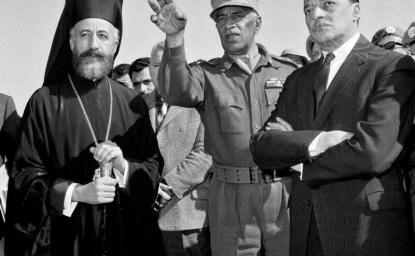Week One: July 12-16
Monday, July 12:
Morning: Registration and Orientation
Afternoon: Introduction/Overview/Problems and Pitfall of Using Communist Communist Archives (speakers: Hershberg/Zubok)
Tuesday, July 13:
Section One: The Origins of Soviet-American Rivalry and the Cold War in Europe and the Near East
Morning: Roots of Confrontation: The World War II Experience and the Cold War (speakers: Zubok/Vojtech Mastny)
Afternoon: The Division of Central Europe and Cold War Origins (speakers: Zubok/Mastny)
Wednesday, July 14:
Morning: Visit to National Security Archive: Talk by Thomas S. Blanton on Using the Freedom of Information Act
Afternoon: Origins of the Cold War in the Near East (speakers: Zubok/Malcolm Byrne)
Thursday, July 15:
Morning: The Divistion of Germany and Cold War Origins (speaker: Christian Ostermann)
Afternoon: The Hidden History of the Warsaw Pact (speaker: Mastny)
Friday, July 16:
Section Two: Cold War to Hot: The Cold War in Asia
Morning: The Chinese Civil War and the Cold War (speaker: Chen Jian)
Afternoon: Free
Week Two: July 19-23
Monday, July 19:
Morning: The Making of the Sino-Soviet Alliance (speakers: Chen Jian/Zubok)
Afternoon: The Soviet Union and the Origins of the Korean War (speaker: Kathryn Weathersby)
Tuesday, July 20:
Morning: Moscow, Beijing, and Chinese Intervention in the Korean War (speakers: Chen Jian/Weathersby)
Afternoon: Crises in the Taiwan Straits (speaker: Chen Jian)
Wednesday, July 21:
Morning: Visit to Cold War International History Project/Wilson Center
Afternoon: The Sino-Soviet Split (speakers: Chen Jian/Zubok)
Thursday, July 22:
Morning: The Indochina Conflict and the Cold War (speakers: John Prados, Chen
Jian, Robert Brigham)
Afternoon: Escalation of the Vietnam War (speakers: Prados, Chen Jian, Robert Brigham)
Friday, July 23:
Morning: The Sino-American Opening, the Vietnam War and Triangular Diplomacy (speakers: William Burr, Chen Jian)
Afternoon: Free
Week Three: July 26-30
Section Three: Rocking the Bloc: the Post-Stalin Succession Struggle and the Straining of the Soviet Empire
Monday, July 26:
Morning: Khrushchev, Beria, and the Power Struggle in Moscow, and the 1953 East German Uprising (speakers: Zubok/Ostermann)
Afternoon: Trouble in the Empire: The 1956 Crises in Poland and Hungary and the Legacy of the Stalin-Tito Split (speakers: Zubok/Ostermann/Malcolm Byrne)
Tuesday, July 27:
Morning: Advent of the Brezhnev Doctrine: Crushing the Prague Spring (speakers: Zubok/Byrne)
Afternoon: Solidarity and the Polish Crisis (speakers Hershberg/Byrne)
Wednesday, July 28:
Morning: Visit to be determined (State Departments Historian's Office?)
Section Four: Nuclear Danger and the Cold War
Afternoon: Stalin, Khrushchev and the Bomb (speakers: Zubok/Hershberg)
Thursday, July 29:
Morning: The Berlin Crisis (Zubok/Burr/Hope Harrison)
Afternoon: Origins of the Cuban Missile Crisis (Hershberg/Zubok)
Friday, July 30:
Morning: Khrushchev, Kennedy, and Castro on the Brink (Hershberg)
Afternoon: Free
Week Four: August 2-6
Section Five: The Cold War in the Third World and the Collapse of Détente
Monday, August 2:
Morning: Washington and Castro: Evolution of a Confrontation (speakers: Peter Kornbluh/Piero Gleijeses)
Afternoon: Angola, Ethiopia, and the Erosion of Détente (speakers: Gleijeses/Hershberg)
Tuesday, August 3:
Morning: The Soviet Intervention in Afghanistan (speaker: Zubok)
Section Six: To the End of the Cold War
Afternoon: Reagan and the "Second" Cold War (speakers: Hershberg/Garthoff)
Wednesday, August 4:
Morning: Visit to be determined (Center for Study of Intelligence, CIA?)
Afternoon: Gorbachev's Struggles for Reform (speaker: Zubok)
Thursday, August 5:
Morning: The Revolutions of '89 and the Soviet Collapse of '91: Competing Explanations (speakers: Hershberg/Zubok/Byrne)
Afternoon: Teaching the Cold War: Using New Media (speakers: Hershberg/Zubok/Harrison & general discussion)
Friday, August 6:
Morning: Departure formalities/closing discussion
Afternoon: Free
NB: In addition to those sessions where they are specifically listed as speakers, Hershberg/Zubok will attend most or all sessions. For several sessions, to be decided, episodes (or excerpts) from the CNN documentary series "Cold War" will be screened and discussed.

Cold War International History Project
The Cold War International History Project supports the full and prompt release of historical materials by governments on all sides of the Cold War. Read more




